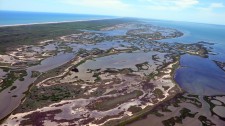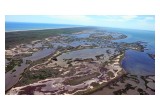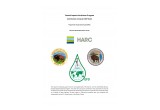Revenue Sharing in Coastal States Supports Economic Development

The Woodlands, Texas, December 1, 2016 (Newswire.com) - The Environmentally Friendly Drilling Systems (EFD) Program of the Houston Advanced Research Center (HARC) just released a report detailing the accomplishments of numerous projects in the Coastal Impact Assistance Program (CIAP). The report documents results of the CIAP program initiated through the Energy Policy Act of 2005 to assist states affected by offshore oil and gas development.
Projects were executed in states of Alabama, Alaska, California, Louisiana, Mississippi, and Texas for needed coastal environmental restoration and enhancements. The nearly $1 billion CIAP program is managed by the US Fish and Wildlife Service, with a total of 769 grants awarded. The EFD report highlights many benefits of revenue sharing realized through CIAP, along with a number of recommendations to improve similar programs in the future.
The Texas CIAP effort also enabled needed research that developed cost-effective technologies and practices addressing environmental aspects and workforce development along the coast.
Rich Haut, Ph.D., HARC Program Director, Energy Production
Revenue sharing in coastal states supports economic development
In Texas, over $109 million in funds were allocated by CIAP. A diverse array of projects ranged from sea turtle conservation to marsh restoration research. "The Texas CIAP effort also enabled needed research that developed cost-effective technologies and practices addressing environmental aspects and workforce development along the coast," explained Rich Haut, Energy Production Director at HARC. "We managed 16 different research projects that significantly advanced best practices and developed practical guidelines that can help direct future efforts."
Earlier this year EFD hosted a workshop with all the CIAP state directors, key stakeholders and the US Fish and Wildlife Service to exchange information about their successful programs. The full report, Coastal Impact Assistance Program: Coordination among all CIAP States, documents successful projects and lessons learned, with insights and recommendations for improving future coastal reinvestment programs, see:
About the Coastal Impact Assistance Program
CIAP was authorized by Section 384 of the Energy Policy Act of 2005 ending December 31, 2016. The Secretary of the Department of the Interior was authorized to administer and distribute roughly $960 million appropriated to offshore oil and gas-producing States and Coastal Political Subdivisions (CPS), which are comprised of affected coastal county, parish and borough governments. Funds were allocated annually by the formula prescribed by Congress, to the States of Alabama, Alaska, California, Louisiana, Mississippi, and Texas, along with 67 eligible CPSs. Federal grant funds were administered by the Department of the Interior through the US Fish and Wildlife Service with a mission to conserve, restore, enhance, and protect renewable natural resources.
About HARC and the Environmentally Friendly Drilling Systems (EFD) Program
HARC is an independent research hub providing expert analysis to people seeking scientific answers on energy, air, and water issues. Research activities support the implementation of policies and technologies that promote sustainability based on scientific principles. HARC is a 501(c)(3) nonprofit organization building a sustainable future in which people thrive and nature flourishes. The EFD Program, managed by HARC, provides unbiased science to address environmental aspects of oil and gas development.
Contact:
Rich Haut, Ph.D.
HARC Program Director, Energy Production
(281) 364-6053
rhaut@HARCResearch.org
www.efdsystems.org
Source: Houston Advanced Research Center (HARC)


